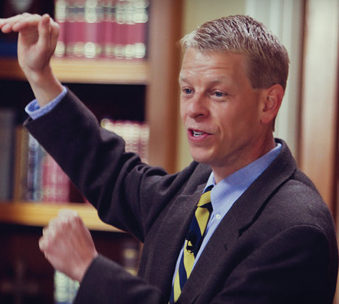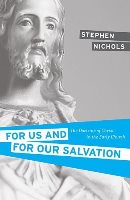Welcome to Books At a Glance as we continue our brief discussions about the Protestant Reformation of the sixteenth century. I’m Fred Zaspel, and we have with us again Dr. Stephen Nichols, President of Reformation Bible College and the well-known author of many books on Church History. Today we talk about the Spread of the Reformation in Europe.
Steve, you’ve been a great guide – thanks for talking to us again.
Nichols:
Oh, my pleasure.
Zaspel:
When we in the English speaking world think of the Reformation, we tend to think in terms of Germany and Geneva and Great Britain. But let’s talk about how the Reformation spread out further in Europe. First, Holland. How is the Dutch Reformation important to remember?
Nichols:
Yes. This Calvinism that was very much a part of, well, let’s say the reformed church that was very much in the Swiss city states, made its way up among the Dutch and very much found a home there. We see it, especially in the early 1600s, is where much of what Calvin had taught was challenged and in the response to those challenges, we had this wonderful, systematic expression of much of Calvin’s teaching. This comes to a head in the 1610s in the town, or port city of Dordrecht. The response of that is a synod that’s called at Dort, or Dordrecht, and the response of that synod is the Canons of Dort. That’s a very crucial document in the history of the Christian tradition that codifies for us what we have come to call the Five Points of Calvinism. I think many people who talk about the five points and debate the five points would be really well served if they actually went and read the Canons of Dort. They are wonderfully thorough, biblically rich—I would even say, spiritually nourishing texts. One of the things you’ll find in there is that it’s actually a different order, it’s not TULIP, it’s ULTIP (which is not a flower, ULTIP). It starts with God and the decree of God, the decree of election, and flows from there. So that’s one piece that’s really crucial to the history of the Reformation that the Netherlands played a role in.
Zaspel:
What are the Three Forms of Unity? And what was their role in the spread of Reformation theology?
Nichols:
Yes, so another key city here is Heidelberg. A beautiful city, with the castle up on the hill overlooking the city, I mean, this is one of the most picturesque places. And there’s the University down below and the Cathedral there in the center right up against the river. There are two figures, Casper Olivianus and Zacharias Ursinus.
And, hopefully, your folks there at Books At A Glance will probably be glad to know there’s no quiz at the end of this (laughing). They won’t have to know how to spell that. How do you spell Casper Olivianus?
They come together and write what has to be one of the most beautiful documents of the Reformation – the Heidelberg Catechism, with that great first question, Heidelberg 1, “what is our only comfort in life and death?” And the short answer is, the Gospel. But read it for the longer answers, that’s so beautiful. Heidelberg 1 is probably one of the most beautiful pieces of theological expression in the history of the Christian tradition, just a beautiful text.
So that’s the Heidelberg Catechism and then the Belgic Confession, which is a Confession of faith, and then the Canons of Dort. And those, together, form the Three Forms of Unity, and that then becomes the confessional basis of the Reformed Church, especially of the Dutch expressions of that Reformed Church. So, you have the Augsburg Confession for the Lutherans, and the broader pieces of the Book of Concord. You have the Westminster Standards, of course, for the Presbyterians, and then you have the Three Forms of Unity.
Zaspel:
What other countries were significantly shaped by Reformation? Hungary, Scandinavia, France? And how did the Reformation spread there?
Nichols:
Yes. Scandinavia is interesting. Some of Luther’s students who are from Scandinavia went back, they were met at the border, they were asked if they would repeat Luther’s doctrines, and they were immediately arrested. These monks were martyred and they were some of the first martyrs of the Reformation. Word gets back to Luther and he writes his first hymn to commemorate their deaths. It’s really a folk ballad, it’s 17 stanzas long, and it’s entitled A New Song Shall Here Be Begun. That sort of represents that in any of these other countries, they did not enjoy a Frederick the Wise, or a Henry VIII, or an Edward VI, or the Consistory of Geneva. And so they had these political powers that were more bent on the status quo and seeing the Reformation as a dangerous thing.
And so, you see in these other places where the story of the Reformation is one of an underground church. This is especially true of France. It’s fascinating that at Geneva trained all of these missionaries, church planters, really, and they were French. Calvin himself said that he lived in Geneva but his heart was always turned toward France. And Geneva is just over the border; the students would come across the border, study at Geneva, get funded by the city of Geneva, go back into France and ended up planting a network of underground churches.
There’s the story of Juan de Valdes, who we think of when we think of the Reformation in Spain. This is a Spanish figure who gets interested in the Reformation ideas, is converted, finds that he has to leave Spain, travels to Europe and travels outside of Spain in the German regions, and while he is there, he works on publishing a translation of the New Testament into the Spanish language, gets it printed and is able to smuggle it back in to Spain.
And so as we look at this we see that the same is true of the story of the Reformation in Italy. There’s the reformer, Peter Martyr Vermigli, who is preaching the gospel and ends up getting exiled and has to leave Italy.
You look at the countries around the Swiss city states and Germany and the UK, and it’s really a story of martyrdom and a story of the underground church. But we need to realize that the gospel was not absent. The light of the gospel was even penetrating those dark places in the 16th century.
Zaspel:
So, there’s some countries where there would have been Protestant reformers, but the countries themselves were not deeply affected or didn’t deeply experience the Reformation, right? And let me add to that, within a century, say, how had the Reformation affected the map of Europe?
Nichols:
Yes, that’s very true. You look at this and you see the Spanish Inquisition and that was sort of to keep the Reformation at bay, as it were, in Spain, Portugal and Italy. You can even look at this – the further you get away from the Pope, and the further you get away from Rome, the more the Reformation flourished. And that, again, points to that rise of the modern nation/state that we were talking about back a few episodes earlier. You have those countries, but as far as what’s happening a century later is you still see the Reformation having a place; and it is still impacting these places where it was established in the 16th century. It’s really, as we start to get into the turn of the 17th into the 18th century that once again a darkness begins to descend. And we could just use Geneva as an example. You have two very famous people associated with the city of Geneva, thinkers in the history of Western thought – John Calvin and the native-born Genovese, Jean-Jacques Rousseau. And when you look at those two ideas, they could not be more different. Calvin recognizes the total depravity, and yes, we have human dignity, but we must recognize sin, and we are by nature children of wrath and we are born sinners. And then you have Jean-Jacques Rousseau – man is born free and everywhere he is in chains. We are good, we are great; as individuals we have got to throw off the shackles of society which make us bad. These could not be two more polar opposite philosophies and worldviews. Which one won? Rousseau won. As you come into Geneva, there’s a little island there, out in the lake by the old city, and there’s a huge statue to Rousseau. Rousseau clearly won the day. And again, we see that darkness has once again descended upon these lands.
Zaspel:
We’re talking to Dr. Stephen Nichols about the Protestant Reformation. He is the author of The Reformation: How a Monk and a Mallet Changed the World – as well as many other church history related books that you’ll want to check out on this page. Join us next time as we continue our brief chats on the Protestant Reformation.
Steve, you’ve been a great help for us over these studies. Thanks so much.
Nichols:
Oh, it’s been my pleasure. I’ve enjoyed talking about the Reformation with you. Thank you.
Editor’s Note: Below are some titles by Dr. Stephen Nichols that will be of interest to you!
The Reformation: How a Monk and a Mallet Changed the World
Paperback
Kindle
Martin Luther: A Guided Tour of His Life and Thought (Guided Tour of Church History)
Paperback
Kindle
The Church History ABCs: Augustine and 25 Other Heroes of the Faith
Paperback
Kindle
Welcome to the Story: Reading, Loving, and Living God’s Word
Paperback
Kindle
Jesus Made in America: A Cultural History from the Puritans to “The Passion of the Christ”
Paperback
Kindle
For Us and for Our Salvation: The Doctrine of Christ in the Early Church
Paperback
Kindle
Ancient Word, Changing Worlds: The Doctrine of Scripture in a Modern Age
Paperback
Kindle
Pages From Church History: A Guided Tour of Christian Classics
Paperback
Kindle
Heaven on Earth: Capturing Jonathan Edwards’s Vision of Living in Between
Paperback
Kindle
J. Gresham Machen: A Guided Tour of His Life and Thought (Guided Tour of Church History)
Paperback
Kindle
An Absolute Sort of Certainty: The Holy Spirit and the Apologetics of Jonathan Edwards
Paperback

